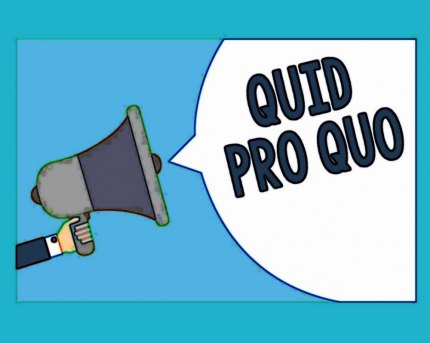
The context, of course, is a July 25 phone call during which Ukrainian President Volodymyr Zelensky said he wanted to purchase Javelin anti-tank missiles from the U.S. When President Donald Trump responded, he began, "I would like you to do us a favor though..."
Trump explained that he wanted Zelensky to investigate a theory involving 2016 election interference. During the same call, he also mentioned that Zelensky should look into the activities of Hunter Biden, once a board member of a Ukrainian energy company and the son of Joe Biden, Democratic presidential hopeful.
Now, politicians are debating whether Trump should be impeached and removed from office, as he seemingly implied that the U.S. military support was dependent on Zelensky doing him a political favor.
This is where the phrase "quid pro quo" comes in. Where did this phrase originate, and why does it matter so much? Here is the rundown, along with links and sources for further study.
What is a quid pro quo? The definition, courtesy of Merriam Webster online, is simply, "something given or received for something else." It is a Latin phrase that roughly translates as "something for something" and has been used in English since the late 1500s, according to The American Heritage Dictionary of Idioms by Christine Ammer (Houghton Mifflin; 2003).
So, how is this case different?
To start with, Zelensky was discussing the purchase of weapons. Trump responded with "I would like you to do us a favor though..." and pivoted to a personal and political request. It sounded as though Trump was A) withholding the sale of arms until Zelensky performed a political favor; and B) inviting foreign interference in a U.S. election.
Trump previously indicated he didn't think accepting such information from a foreign government was a problem. In a June interview, ABC News Chief Anchor George Stephanopoulos asked the president whether he would accept information about a political opponent from a foreign government -- or call the FBI.
"I think maybe you do both," Trump said.
Pressed by Stephanopoulos about the propriety of foreign interference in U.S. elections, Trump responded, "It's not an interference. They have information. I think I'd take it. If I thought there was something wrong I'd go maybe to the FBI."
Trump's remarks alarmed U.S. election officials. Ellen L. Weintraub, chairman of the Federal Election Commission, immediately dispensed a press release: "Let me make something 100 percent clear to the American public and anyone running for public office: It is illegal for any person to solicit, accept or receive anything of value from a foreign national in connection with a U.S. election. This is not a novel concept. Electoral intervention from foreign governments has been considered unacceptable since the beginnings of our nation. Our Founding Fathers sounded the alarm about 'foreign interference, intrigue and influence.' They knew that when foreign governments seek to influence American politics, it is always to advance their own interests, not America’s. Anyone who solicits or accepts foreign assistance risks being on the wrong end of a federal investigation. Any political campaign that receives an offer of a prohibited donation from a foreign source should report that offer to the Federal Bureau of Investigation."
Did Trump know he was doing something wrong? One argument voiced by Republican Sen. Ted Cruz, R-Texas, and reported in The Washington Post, is that quid pro quo is only illegal if there is corrupt intent. (Corrupt intent is defined as "doing something with the full knowledge that it is illegal," according to The Law Dictionary online.)
Is this an impeachable offense? That's the million-dollar question. On NBC's "Meet The Press" Sunday, Rep. Tom Cole, R-Okla., said, "We know the president says there was no quid pro quo. We know President Zelensky said he didn't feel any pressure. We know there's no Ukraine investigation. And we know the military aid got there. Those are things we know. So no, I don't think there was a quid pro quo."Democratic lawmakers in the U.S. House of Representatives hold a different view. They are proceeding with an impeachment inquiry because they believe Trump crossed the line.
"Soon, the American people will see new evidence of the president's abuse of power," tweeted Rep. Adam Schiff, D-Calif., chairman of the House Intelligence Committee. "Every member of Congress will have to answer: is soliciting foreign interference in our elections acceptable? The answer must be no. Americans decide American elections."
Resources:
- ABC News: "I think I'd take it." In exclusive interview, Trump says he would listen if foreigners offered dirt on opponents, by Lucien Bruggeman, June 13, 2019.
- Merriam Webster online: Quid pro quo.
- The Law Dictionary.org: Corrupt intent.
- NBC's Meet The Press: Transcript, Sunday, Nov. 3, 2019.
- The American Heritage Dictionary of Idioms by Christine Ammer (Houghton Mifflin; 2003).
- U.S. Federal Elections Commission: Statement Regarding Illegal Contributions from Foreign Governments, by Ellen L. Weintraub, chairman of the Federal Election Commission, June 13, 2019.
- The Washington Post: Growing number of GOP senators consider acknowledging Trump’s quid pro quo on Ukraine, by By and
- Whitehouse.gov: Memorandum of telephone conversation, President Zelensky of Ukraine, July 25, 2019.
Related:
What are "whistleblower" protections?
What are high crimes and misdemeanors?
Like us on Facebook and tell us what you think.